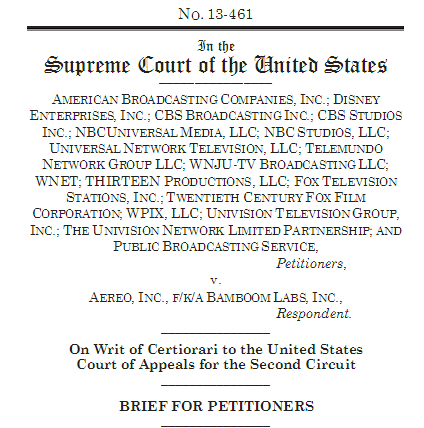aNewDomain.net — Aereo, the Barry Diller-backed firm that’s using grids of dime-sized antennas in New York and elsewhere to deliver freely-available local broadcast television content to consumers on mobile devices, is in the U.S. Supreme Court this week. In the ABC et al vs. Aereo Supreme Court case, things are getting mighty interesting.
It’s so interesting that we’re including for you, in this piece, all the oral argument docs, court filings and amicus briefs that the nine justices at the nation’s highest appellate court are seeing. Find them all below the fold, in full.
Beginning this week, ABC, FOX, NBC, CBS and more than a dozen other broadcasters who sued Aereo two years ago are getting their final chance to argue that Aereo is stealing content and/or copyright and “tricking” TV companies with its one antenna to one mobile device technology in order to do it.
We’ll be covering this landmark case as it unfolds. The outcome stands to affect not just Aereo, which the TV companies have publicly said they want dead and gone, but also the future of cloud tech and other technologies that threaten old school media. You’ll see in-depth legal analysis, tech analysis and commentary in these pages from our team of experts in the days ahead.
For now, we’re collecting all relevant documents to the Aereo Supreme Court case, beginning with the transcripts from April 22, 2014 oral arguments before the nine justices. Also included below will be arguments from the petitioner — ABC et al — plus Aereo’s response and the full text of 30 amicus briefs that experts and companies filed to inform the court on both sides of the matter.
That way you can see what the Supreme Court justices are seeing — and get an insider’s view into the case.
As you’ll see in the oral arguments below, several of the judges expressed concern that a ruling against Aereo could endanger other cloud-based services. Services like Dropbox, Amazon Prime, Hulu and Google Music. You get the idea.
Also interesting is a comment from Justice John Roberts, who said today in oral arguments that he “was fine with (Aereo’s) technological model (being) based on circumventing legal prohibitions that you don’t want to comply with” while questioning the copyright issue at the heart of the battle.
Aereo vs. ABC et al in Supreme Court, oral arguments — transcript by Gina Smith
Here’s what ABC et al filed with the Supreme Court — a petitioner’s brief. This contains all the arguments the broadcasters are making, readable in full below.
ABC vs. Aereo, ABC et al’s Petitioner’s Brief to the Supreme Court 13-461 ABC Et Al by Gina Smith
Here is another document from ABC et al that replies specifically to Aereo’s claims that its technology and business model do not constitute a theft of content, copyright or other material from over-the-air broadcasters.
ABC vs. Aereo: ABC’s Reply to Aereo’s arguments, U.S. Supreme Court Filing by Gina Smith
And now on to the amicus briefs, filed by parties in favor of both sides. Here’s a list of all the briefs publicly filed so far for the Supreme Court’s information. The word “petitioners” refers to the broadcasters. The word “respondent” refers to Aereo. You’ll see some interesting bedfellows here. Check it out.
Amicus Briefs
- Brief for American Intellectual Property Law Association in Support of Petitioners
- Brief for the American Society of Composers, Authors and Publishers (ASCAP), Broadcast Music, Inc. (BMI), The National Music Publishers’ Association (NMPA), The Recording Industry Association of America (RIAA), Sesac, Inc., The Recording Academy, The Songwriters Guild of America, Inc. (SGA), The Church Music Publishers Association (CMPA), The Nashville Songwriters Association, International (NSAI), and Soundexchange, Inc. in Support of Petitioners
- Brief for Cablevision Systems Corporation in Support of Petitioners
- Brief for Copyright Alliance and Various Professors in Support of Petitioners
- Brief for the International Center for Law & Economics and the Competitive Enterprise Institute in Support of Petitioners
- Brief for International Federation of the Phonographic Industry (IFPI); Asociación Mexicana De Productores De Fonogramas Y Videogramas (Amprofon); Association Littéraire Et Artistique Internationale Du Canada (Alai Canada); Australian Copyright Council (Acc); British Copyright Council (Bcc); Canadian Media Production Association (Cmpa); International Confederation Of Music Publishers (Icmp); International Confederation Of Societies Of Authors And Composers (Cisac); International Federation Of Actors (Fia); International Federation Of Musicians (Fim); Music Canada; Society Of Composers, Authors And Music Publishers Of Canada (Socan); International Copyright Scholars, Et Al., In Support Of Petitioners
- Brief for the Media Institute in Support of Petitioners
- Brief for the National Association of Broadcasters, the ABC Television Affiliates Association, the CBS Television Network Affiliates Association, the NBC Television Affiliates, and the FBC Television Affiliates Association, in Support of Petitioners and Reversal
- Brief for National Football League and Major League Baseball in Support of Petitioners
- Brief for the New York Intellectual Property Law Association in Support of Petitioners
- Brief for Professors Peter S. Menell and David Nimmer in Support of Petitioners
- Brief for Ralph Oman, Former Register of Copyrights of the United States in Support of Petitioners
- Brief for Screen Actors Guild-American Federation of Television and Radio Artists, Directors Guild of America, Inc., Writers Guild of America, West, Inc. in Support of Petitioners
- Brief for Time Warner Inc. and Warner Bros. Entertainment Inc. in Support of Petitioners
- Brief for the United States in Support of Petitioners
- Brief for Viacom Inc., Metro-Goldwyn-Mayer Studios Inc., Independent Film & Television Alliance, International Alliance of Theatrical Stage Employees, Moving Picture Technicians, Artists and Allied Crafts of the United States, its Territories and Canada, AFL-CIO, CLC, The National Association of Broadcast Employees and Technicians-The Broadcasting and Cable Television Workers Sector of the Communications Workers of America, International Brotherhood of Electrical Workers, AFL-CIO, and International Brotherhood of Teamsters In Support of Petitioners
- Brief for Washington Legal Foundation in Support of Petitioners
- Brief for 36 Intellectual Property and Copyright Law Professors in Support of Respondent
- Brief for American Cable Association in Support of Respondent
- Brief for Competition Law Professors, Southwestern Law Student Andrew Pletcher, And Professor Michael M. Epstein, in Association with the Amicus Project at Southwestern Law School, in Support of the Respondent
- Brief for Computer & Communications Industry Association and Mozilla Corporation in Support of Respondent
- Brief for the Consumer Federation of America and the Consumers Union in Support of Respondent
- Brief for Dish Network L.L.C. and Echostar Technologies L.L.C. in Support of Respondent
- Brief for the Electronic Frontier Foundation, Public Knowledge, the Consumer Electronics Association, and Engine Advocacy in Support of Respondent
- Brief for Law Professors and Scholars in Support of Respondents
- Brief for Small and Independent Broadcasters in Support of Respondent
- Brief for Filmon X LLC, et al, in Support of Affirmance
- Brief for BSA the Software Alliance in Support of Neither Party
- Brief for Center for Democracy & Technology, CTIA-The Wireless Association, United States Telecom Association, Internet Infrastructure Coalition, Digital Media Association, and Information Technology Industry Council in Support of Neither Party
- Brief for the Patent, Trademark, & Copyright Section of the Bar Association of the District of Columbia in Support of Neither Party
Many on our team noticed a marked difference in what attorneys for both sides said to the press and what they said formally while under oath. In public comments to reporters, just as an example, the broadcasters’ counsel Paul Clement said “what’s at stake in this case is really that this will change watching broadcast television as we know it.”
He never made any such florid argument on the record or in briefs to the court.
No one would’ve believed it. Traditional TV has long been in decline. The question for them has got be whether and how to slow or stop the bleed.
Do the broadcasters want copyright cash — or do they want Aereo dead? In the past, they’ve said the former, pushing with injunctions against Aereo. But as you see above, attorneys for ABC et al didn’t say that today. Rather, they leaned on a very Silicon Valley-ish argument, saying Aereo wouldn’t die if its antenna-farm tactic was anything more than “just a gimmick.”
I’m Gina Smith, and this is aNewDomain.
developing …
Gina Smith is the New York Times best-selling author of Apple co-founder Steve Wozniak’s memoir, iWoz Computer Geek to Cult Icon: How I Invented the Personal Computer and Had Fun Doing It (W.W. Norton, 2005/2007/2012). With John C. Dvorak and Jerry Pournelle, she is the editorial director at aNewDomain.net. Email her at gina@aNewDomain.net, check out her Google + stream here or follow her @ginasmith888.














In the original case, there were expert witnesses on both sides of the technical question of whether each dime-sized antenna was truly independent and assigned to an individual user or they interacted to constitute a single antenna. (It seems that could be tested by taking one dime-sized antenna and seeing whether it worked on its own and how near the transmitter it had to be placed). Did that technical question come up before the Supreme Court or did they focus solely on the copyright issue?
Even if the antennas are truly independent, it seems like a kludgy work-around. On the other hand, the broadcasts include commercials, so the stations are just trying to protect the fees the cable companies pay them.
Well, that’s the question. How is a one to one antenna any different than a buying a 20 dollar set and attaching bunny ears. If it’s the same — and the company is cleverly working around free OTA stuff and bringing real innovation in the form of streaming to tablets — then tv companies and justices are remiss in slowing innovation. If it’s really more like a public service ripping off copyright, it should pay copyright fees — not be killed, as TV companies suggest. That’s not progress. That’s murder, no?
[…] Editor: Supreme Court Chief Justice John Roberts came out and said in oral arguments on April 23 tha… […]